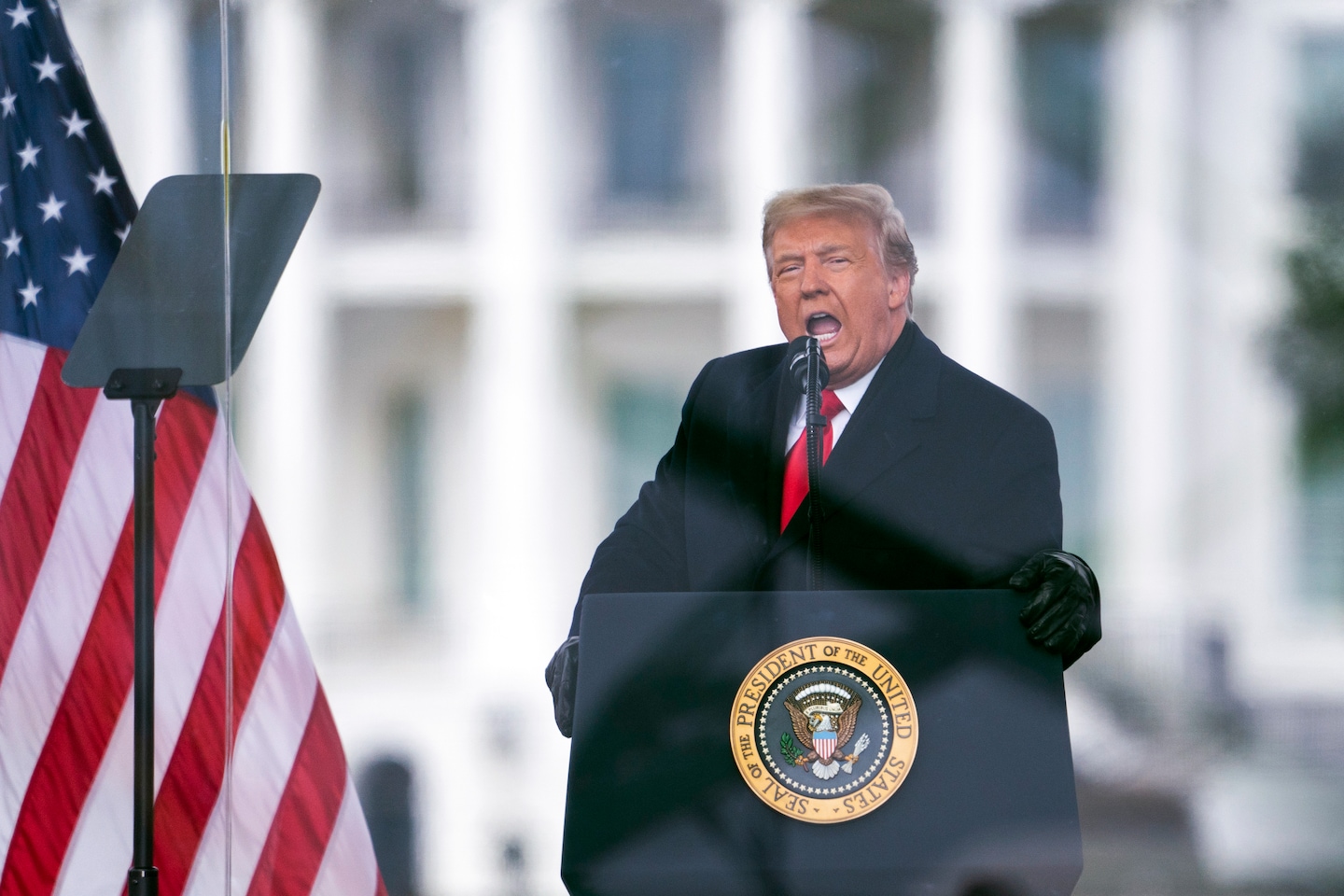A federal judge said Trump probably committed a crime. The DOJ can’t ignore that.

We don’t know whether the Justice Department has been considering criminal charges against Trump, or whether it will. We do know that Attorney General Merrick Garland, in a speech commemorating the one-year anniversary of the Capitol insurrection, vowed that the Justice Department was “committed to holding all Jan. 6th perpetrators, at any level, accountable under law — whether they were present that day or were otherwise criminally responsible for the assault on our democracy.”
Carter’s conclusion makes clear that, for the attorney general’s commitment to be met, the Justice Department’s criminal investigation of Jan. 6 must focus closely on Trump.
The court’s ruling came in a lawsuit that one of Trump’s lawyers, John Eastman, brought against the select committee investigating the Jan. 6, 2021, attack on the Capitol. Eastman served as the legal architect of Trump’s effort to pressure then-Vice President Mike Pence to refuse to count numerous states’ electoral votes on Jan. 6. Eastman asserted his Fifth Amendment right against self-incrimination 146 times at his deposition before the select committee. His lawsuit argued that some of his emails should be kept from the committee because they were shielded by either attorney-client privilege or “work product” privilege, which protects confidential documents prepared for litigation.
The opinion by Carter, a former prosecutor nominated to the bench by President Bill Clinton, makes clear Eastman has good reason to worry about criminal consequences. The attorney-client and work-product privileges must give way if they involve communications that further the commission of a fraud or crime. And Carter found that at least one of the emails did just that.
Carter’s decision was at once pedestrian and remarkable. Pedestrian, because all the 44-page opinion did was methodically recite the law and apply it to the facts. Remarkable, because of where its analysis inexorably led: that a sitting president of the United States, with the help of his lawyer, “more likely than not” violated two federal criminal laws in a desperate effort to keep himself illegally in power.
One of those statutes, 18 U.S.C. § 1512(c), says you can’t “obstruct” or “impede” “any official proceeding,” or even attempt to do so, if you act “corruptly.” The other, 18 U.S.C. § 371, prohibits people from conspiring “to defraud the United States … in any manner or for any purpose.”
These laws clearly cover the congressional counting of electoral votes. The obstruction statute defines “official proceedings” to include “a proceeding before Congress.” Carter became the 11th federal judge in the past four months to hold that the term encompasses the joint session held last Jan. 6.
The law punishing conspiracies to defraud sweeps even more broadly. As Chief Justice William Howard Taft explained for a unanimous Supreme Court a century ago, the language is “broad enough” to cover not only financial frauds, but also “any conspiracy for the purpose of impairing, obstructing, or defeating the lawful function of any department of government.”
For Eastman and Trump, the question boils down to state of mind: whether they acted “corruptly” under the obstruction law, or with the requisite “deceit” or dishonesty under the conspiracy law. And that’s where Carter’s recitation of the facts comes in. Both men, he found, “likely knew” their allegations of electoral fraud were “baseless, and therefore that the entire plan” to stop or delay the electoral-vote count “was unlawful.”
Trump was told, again and again, by “numerous credible sources,” that “there was no evidence of election fraud,” Carter noted. The Department of Homeland Security’s cybersecurity agency said so. An internal Trump campaign memo said so. Trump’s own attorney general, William P. Barr, told Trump as well. So did other Justice Department officials. The vice president told Trump there was no basis not to count the electoral votes. Georgia’s secretary of state said there was no fraud in his state (to which Trump notoriously responded, look, just find one more vote than I need). And over 60 lawsuits on Trump’s behalf went down in flames.
Whether all that, along with other evidence, would suffice to establish criminal intent beyond a reasonable doubt — the burden of proof needed for a criminal conviction — can be left for another day. The point for now is that Carter’s conclusion, that the evidence uncovered so far is more than sufficient to overcome the claimed privileges — is also more than enough to justify a thorough federal criminal investigation of Trump himself, if one isn’t underway already.
A prosecution would involve a novel application of both statutes. But that’s only because never before have we had anyone, let alone a president, try to corruptly obstruct a proceeding so important, or to dishonestly defeat a governmental function so fundamental, as the counting of electoral votes.
As Carter put it, if “Eastman and President Trump’s plan had worked, it would have permanently ended the peaceful transition of power” under the Constitution — by any reckoning, they attempted a coup.
If the law prohibits anything, it ought to prohibit that. And if anything seems like a worthy — indeed, unavoidable — subject for investigation, Trump’s conduct is it.






